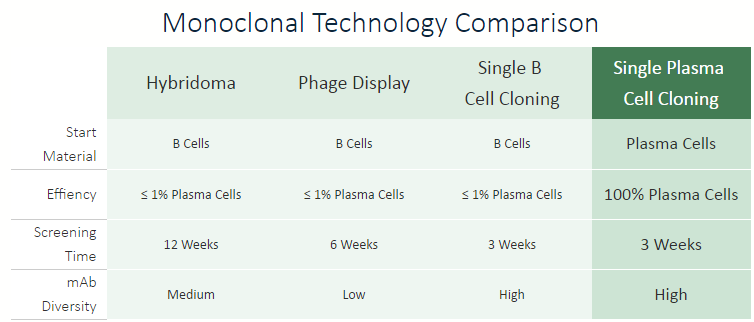This ProSci blog covers the the major rabbit monoclonal antibody development techniques most commonly used, including phage display, rabbit hybridoma, B-cell cloning, and individual plasma cell cloning.
Antibody Basics: Rabbit Monoclonal AntibodiesRabbit Monoclonal Antibody
Monoclonal antibodies developed in mice have been applied in thousands of applications since their  development by Caesar Millstein and Georges Kohler in 1975. Since then, entire businesses have been built on these processes, changing them and making them their own in order to yield new products. Now, we see the emergence of new techniques to generate monoclonal antibodies, this time in rabbits.
development by Caesar Millstein and Georges Kohler in 1975. Since then, entire businesses have been built on these processes, changing them and making them their own in order to yield new products. Now, we see the emergence of new techniques to generate monoclonal antibodies, this time in rabbits.
Rabbit monoclonal antibodies were of interest because rabbit antibodies have an affinity around 10-100x greater than that of mouse monoclonal antibodies, giving them an edge in so many experiments. Even CiteAb reported on the rise in use of rabbit monoclonal antibodies last year. However, generating rabbit monoclonal antibodies was quite a challenge and several methods of development have gone into use, each with their own advantages and disadvantages. Here, I will outline the major rabbit monoclonal antibody development techniques most commonly used: rabbit hybridoma, phage display, B-cell cloning, and plasma cell cloning.
Rabbit Hybridoma
Rabbit hybridoma techniques are incredibly similar to those described in mouse hybridoma technology: the animal is immunized and when antibody titers are at their highest, B-cells are harvested from the spleen of the selected host. These B-cells are then hybridized with myeloma cells, generating an immortal cell line that will continuously produce specific monoclonal antibodies.
Phage Display
Phage display is a highly involved recombinant DNA technique that can be used to generate rabbit monoclonal antibodies and single domain antibodies. After animal immunization, blood is drawn, and the peripheral blood mononuclear cells (PBMCs) or other B-cell producing materials are extracted. RNA is isolated from these cells and used to generate cDNA. The cDNA is then used to construct large libraries of antibodies that can be expressed on the surface of phage and selected for binding to the desired target antigen. The DNA sequence of specific antibodies is easily determined and the antibodies easily expressed and purified.
B-Cell Cloning
B-cell cloning is another recombinant process many labs are using. This method starts much like phage display, where PBMCs or other B-cell producing tissues are isolated. Next, different sorting techniques are used to specifically target the B-cells in the mixture and separate them into individual colonies. The colonies are grown and screened to select the cells expressing the desired monoclonal antibodies. Then, the heavy and light chain variable regions of these antibodies are cloned and expressed in HEK 293 cells.
ProSci’s Individual Plasma Cell Cloning (IPC Technology)
On a surface level, Individual Plasma Cell Cloning is almost identical to B-cell cloning in its method of monoclonal antibody development. The key difference is that instead of isolating all B-cells for screening, we isolate fully developed plasma cells. By isolating plasma cells from the less developed B-cells, we are able to obtain antibodies from the most mature cells. Then, just like in B-cell cloning, the code for the variable heavy and light chains is gathered through PCR and expressed in HEK 293 cells. The antibodies produced through this method are often found to have higher affinity than those generated by B-cell cloning. Also, because plasma cells are separated from other B-cells early on, often times less screening is necessary, leading to faster development.
Below is a matrix of some of the advantages explained above.
For more information on ProSci’s Individual Plasma Cell Cloning technology, please see our Rabbit Monoclonal Antibodies page, or submit an inquiry to abservices@prosci-inc.com
Find out how ProSci can help your Antibody needs today!

